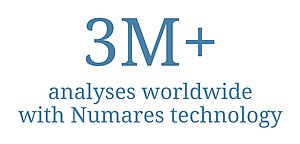New Renal Function Assay. |AXINON® System.
Precision Diagnostics.

This new kidney function assay combines two novel biomarkers, valine and myo-inositol, with creatinine and cystatin C using highly accurate nuclear magnetic resonance (NMR) spectroscopy.
A single result from this biomarker constellation generates a more accurate GFR result compared to standard eGFR equations.
Selected Publications
Meeusen J, Stämmler F, Dasari S, et al. (2022). Front. Med. 9:988989.
Fuhrmann M, Santamaria A, Scott, R, et al. (2022). Diagnostics 2022, 12(5), 1120.
Stämmler F, Grassi M, Meeusen JW, et al. (2021). Diagnostics (Basel). 2021 Dec 7;11(12):2291.
Ehrich J, Dubourg L, Hansson S, et al. (2021). Diagnostics (Basel). 2021 Feb 3;11(2):234
Available as a CE-labled in vitro diagnostic product in the EU
Technology. |AXINON® System.
Easy. Fast. Efficient.

Nuclear magnetic resonance (NMR) spectroscopy is a proven and highly accurate test technology that assesses a variety of compounds at a molecular level.
For GFR(NMR), the generated signals from serum samples corresponds with concentrations of the targeted metabolites with results reported in mL/minute/1.73 m2.
Our AXINON® System, using FDA-cleared technology, is the core platform we use to develop diagnostic tests for illnesses stemming from metabolic dysfunction, including chronic heart, kidney and liver diseases. This system incorporates diagnostic testing algorithms into nuclear magnetic resonance (NMR) spectroscopy for precise results.
To date, more than 3.5 million tests have been performed worldwide using Numares technology.
GFR — One of the most important markers for identifying impaired renal function
Chronic kidney disease (CKD) is a common consequence of many medical conditions, and it's prevalence is rising.
Hypertension and diabetes mellitus — two main CKD causes.
Glomerular Filtration Rate (GFR) is one of the most common tests used, and included in all standard blood panels assessing kidney function.

Currently, GFR determination is based on an estimation using clinical data and blood based biomarkers such as creatinine. GFR can either be measured (mGFR) by tracer based methods or estimated (eGFR) using clinical data and blood based biomarkers such as creatinine or cystatin C. However, mGFR methods are highly elaborate and time-consuming and eGFR lacks accuracy in a variety of common clinical situations. As a consequence clinical decision making is difficult especially early when intervention may retard progression to end-stage renal disease.